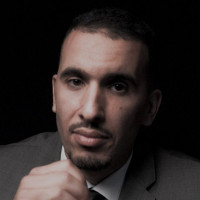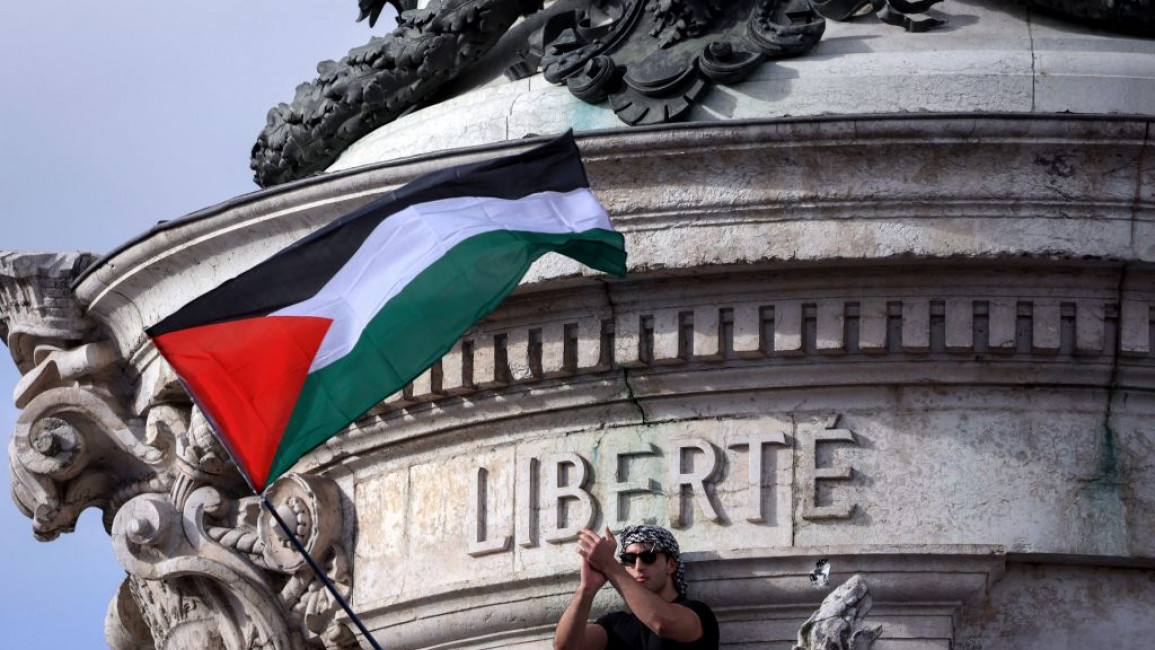
France’s repression of Palestine solidarity isn’t working
Never in recent memory have we seen such glaring double standards and brutal attempts to shut down any support for Palestine. Following the 7 October Al-Aqsa Flood operation, the French government alongside mainstream media were quick to express support for Israel and its sacrosanct “right to self-defence”.
Daring to compare the attacks across the Gaza fence to the terrorist attacks that occurred on French soil during the past decade, a narrative was manufactured to justify unconditional support to Israel. With this, the question of colonisation, turning Gaza into a concentration camp, the ongoing ethnic cleansing in East Jerusalem, the apartheid nature of the Israeli regime and the absolute refusal for Palestinian refugees to return, let alone the recognition of a Palestinian state, were all ignored.
Emmanuel Macron reinforced France’s support for Israel during his address to the nation on 12 October. For ten minutes, the president used his platform to stress on the trauma experienced by Israel, echoing the Israeli narrative on the event. He even referred to the now debunked fake news about the beheading of 40 babies by Hamas. Not a single word about the context in which the attacks took place, nor about the 170 French nationals stuck in Gaza, was mentioned. Macron chose instead to solely focus on the French-Israeli hostages to Hamas who he vowed to bring back home.
''These unapologetic attempts to ban all support for Palestinian’s right to exist, let alone resist genocide, has been ongoing for many years in France. But this has not stopped the public from taking to the streets to condemn Israel’s violence and ongoing oppression of the Palestinian people, even when the ban on protests was fully in place.''
What followed that same day, was the banning of all Palestine support demonstrations and rallies by his interior minister Gerald Darmanin. Though an obscene violation of freedom of expression and assembly for human rights defenders, Macron went on to justify the ban, further refusing to acknowledge Palestinian suffering. Despite later being suspended by France’s highest administrative court, Paris police chief Laurent Nuñez doubled down on the ban and called it a moral duty.
To add insult to injury, Yael Braun Privet, the president of the National Assembly, took a trip to Israel to visit Benjamin Netanyahu alongside MP Meyer Habib. During her visit she declared that “nothing should prevent Israel from defending itself” and refused to condemn the bombing of civilians in Gaza, despite having done so in relation to Ukraine-Russia.
The repression only worsened from there.
Palestinian activist Mariam Abou Daqqa was served a deportation order by the interior ministry after arriving in Marseille as part of a speaking tour and was put under house arrest. Whilst this was later suspended, this set strong tone of repression in France in relation to anything Palestine related.
Furthermore the general secretary of the General Confederation of Labour (CGT) in the North of France, Jean-Paul Delescaut, was arrested after being accused of apologism of terrorism and provocation of hatred and violence because of the support he expressed for Palestinians.
As was the case during Israel’s previous heavy assaults on Gaza in 2021, 2014 and those before, the French government has been relentlessly attempting to suppress any voice that calls for the liberation of Palestine and Palestinians. The weaponisation of antisemitism has been one of the key tools that has been used to do this, because it has proven to be very effective.
Unsurprisingly, the only solidarity expressed towards Palestinians came from left-wing Jean Luc Mélenchon and his party La France Insoumise (France Unbowed). Even they were not protected from state silencing on the question, however. Darmanin stated that one of their MPs, Danièle Obono, should face a criminal investigation over potentially ‘justifying terrorism’ because she called Hamas a “resistance movement”.
Even celebrities are not safe in the land of so called freedom of speech. Footballer Karim Benzema was directly attacked by the interior minister following a Tweet in support of people killed in Gaza.
Darmanin alleged that Benzema had links with the Muslim Brotherhood whilst speaking on the CNews Channel. The outrageous and baseless accusation which the minister did not back up with any evidence, still rallied momentum.
Conservative Senator Valérie Boyer went as far as calling for the stripping of his citizenship and the removal of his Ballon d’Or.
As for mainstream French media more generally, little to no attempts have been made to provide non-bias coverage, the dominant narrative remains disproportionately in support of Israel. The use of Hamas as a pretext, and the repetition ad-nauseam of Israel’s right to self-defence, has left no room for real debate on the subject.
Only a few have managed to voice criticism of Israel’s actions, but even this felt it was only the case once Palestinians killed had surpassed the number of victims of the Srebrenica genocide.
One surprising opponent to the French state’s line, has been former PM Dominique de Villepin, who after initially walking a tight rope right following the 7 October, has said that self-defence should not give Israel the right to commit indiscriminate vengeance.
These unapologetic attempts to ban all support for Palestinian’s right to exist, let alone resist genocide, has been ongoing for many years in France. But this has not stopped the public from taking to the streets to condemn Israel’s violence and ongoing oppression of the Palestinian people, even when the ban on protests was fully in place.
Even an MP, Mathilda Panot, made a speech at the National Assembly that addressed the injustice and subsequently went viral.
Furthermore, the lifting of the ban on Palestine solidarity protests is in itself a victory that should be marked, especially following years of Macron’s government attacking political dissent, which at times has even been deadly.
Social media has of course played a large role in the masses being able to express their anger, organise politically and hold leaders to account. This has stripped bias mainstream media of its monopoly over the ‘narrative’ and allowed alternative means to expose Israel’s crimes and France’s complicity.
Since Russia’s invasion of Ukraine and the outpouring of support that Ukrainians received around the world, including the defence of their right to resistance, the political double standards by Western states like France have become much more difficult to feed the masses. This has been visible in public opinion which the ‘pro-Israel side’ is said to be losing.
Whether all of this will translate into political change from above is entirely dependent on the level of pressure from below.
Yasser Louati is a French political analyst and head of the Committee for Justice & Liberties (CJL). He hosts a hit podcast called "Le Breakdown with Yasser Louati" in English and "Les Idées Libres" in French.
Follow him on Twitter: @yasserlouati
Have questions or comments? Email us at: editorial-english@newarab.com
Opinions expressed in this article remain those of the author and do not necessarily represent those of The New Arab, its editorial board or staff.




